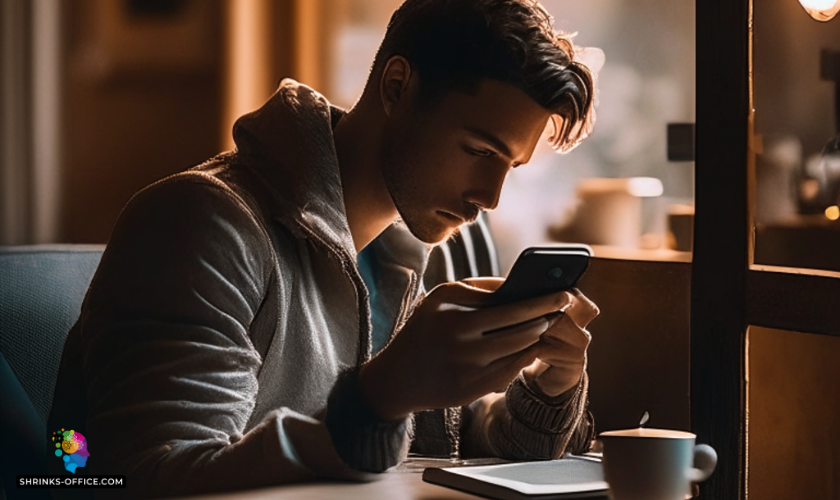How To Break Your Social Media Addiction
- Acknowledge the problem
- Set specific goals
- Track your usage
- Turn off non-essential notifications for social media apps
- Set specific times during the day when you can check your social media
- Reduce the number of people, pages, or groups you follow to limit the amount of content you're exposed to
- Replace social media time with more meaningful activities
- Implement a digital detox
- Share your goals with friends or family and ask for their support
- Stay focused on your goals, and remember that progress might be slow but is still worthwhile
For more, read Social Media Addiction: Recognizing the Signs and How to Overcome It.
Addiction to social media usage has been on the rise in recent times. Social media addiction can potentially harm one's emotional well-being, physical health, interpersonal relationship connections, and even mental health. If you have this issue, learning practical techniques to break social media addiction is crucial.
We'll discuss how to withdraw from social media platforms successfully and your options. We will also compare and contrast the withdrawal symptoms of social media and other addictions. Finally, we'll reveal what you can gain by reducing your time on social media.
If your looking for a more general overview of social media addiction, we recommend our other blog on social media addiction, where we discuss its negative impacts on mental and physical health.
Did you know?
Excessive social media use can trigger anxiety, making it a double-edged sword in our digital age.

How to limit your use of social media
In 2018, the average time spent daily on social media by persons with access to the internet worldwide was 144 minutes. However, studies show that an average of 30 minutes of social media use per day, is best for mental wellness. [1]
While abstinence is commonly advocated to treat substance abuse, moderated internet use is the most psychologically beneficial consequence when dealing with social media addiction. Although complete abstinence from social media isn't required, it is helpful to have methods in place for establishing reasonable restrictions on usage.
If you don't want to quit social media but want to break free from the so-called social media addiction, the following tips below will help you shape your life when using social media apps.

Limit your time for social media use.
To mitigate the negative impacts of social media on your health, life, and relationships, it is crucial to limit your use. How can you achieve this? Here are some specific steps to guide you:
Set Clear Boundaries:
To start, establish specific times or days of the week for social media use. For instance, you might decide to only use social media during lunch breaks or after work hours. This also involves setting a daily limit—30 minutes or less can be an effective starting point. Remember, you don't have to delete apps entirely to gain control over your social media habits.
Employ Time-Tracking Tools:
Use tools such as timers or apps that monitor your social media usage. These can be set to block access to these sites after a specific amount of time has passed, helping you stick to your predetermined limits.
Additional Techniques for Managing Social Media Time:
Here are more strategies to help you manage your social media use effectively:
- Use Timers or Alarms: When you start using social media, set a timer or an alarm for the amount of time you've allowed yourself. Once the timer or alarm goes off, log out of your social media accounts immediately.
- Utilize App Limit Features: Most smartphones have features that allow you to set daily limits for specific apps. Check your phone’s settings to see if this is a feature you can use.
- Schedule Social Media Free Hours: Designate certain hours of the day as being social media free. For example, you might decide not to use social media after dinner.
- Have a 'Screen-Free' Day: Choose one day a week where you will avoid all screens, not just social media. This can help you break the cycle of dependency on digital devices.
- Turn Off Push Notifications: Disable push notifications for all your social media apps. This will reduce the temptation to check your accounts every time you receive a notification.
- Unfollow or Mute Distractions: Unfollow or mute accounts that don't provide value to you. This will help reduce the amount of time you spend scrolling through your feed.
- Replace with Productive Activities: Whenever you feel the urge to check your social media, do a productive activity instead. This could be reading, walking, meditating, or anything else that you enjoy.
- Use Apps to Help: Consider using apps that block social media during certain times of the day. Examples include Freedom, StayFocusd, and SelfControl.

Participate in a social media cleanse and digital detox.
Researchers in 2019 found that some students who disconnected from social media for five days reported feeling a "sense of serenity" and a sense of self-worth. While others were worried they would be left behind. [2] Participating in a social media cleanse or a digital detox is an effective way to break your social media addiction. Here's how you can embark on this journey:
- Set Clear Goals: First, determine the length of your digital detox. Whether it's for a few hours, a week, or even a month, setting a clear goal will guide your journey. The detox could involve all digital devices or be specifically targeted at social media.
- Inform Your Contacts: Let your friends, family, and anyone who might try to contact you know about your detox plan. This not only manages their expectations but also prevents any misunderstandings.
- Remove Temptations: Make your detox easier by removing potential temptations. Uninstall social media apps from your devices, or at least move them to a less accessible place on your device.
- Plan Alternative Activities: Have a list of activities ready to fill the time you would usually spend on social media. This could be reading a book, exercising, spending time in nature, or picking up a new hobby. The key is to keep your mind engaged and ward off the temptation to check your phone.
- Create a Tech-Free Zone: Designate a specific area in your home where no devices are allowed. This could be your bedroom, to improve sleep, or the dining room, to encourage conversation during meals.
- Practice Mindfulness: Take this time to practice mindfulness. Notice the world around you without the lens of social media. Try to be present in the moment, and appreciate the serenity that comes with it.
Helpful tip: Follow online therapist influencers for helpful insights on managing social media addiction. Their tips can be a game-changer for your mental health

Never compare yourself with others.
Dissatisfaction with one's appearance and depression are major causes of social media addiction. The allure of comparing oneself to others through their social media posts is compelling, and it's easy to get drawn in. [3] However, remember that the content on social media platforms does not necessarily indicate reality. People generally only share the highlights of their lives and frequently create or filter their images to make them look better.
Steps to Avoid Comparison
- Practice Self-Awareness: Recognize when you're starting to compare your life to others'. If scrolling through your feed makes you feel inferior or envious, it might be time to take a step back.
- Limit Exposure to Triggers: If certain accounts or types of posts tend to spark feelings of comparison, limit your exposure to them. This might involve unfollowing certain accounts, limiting your time on specific platforms, or even taking a break from social media altogether.
- Practice Gratitude: Spend a few moments each day recognizing and appreciating what you have. By focusing on your own life and blessings, you can help shift your perspective away from what others have.
- Remember Social Media Isn't Reality: While it's easy to be swayed by the perfect images on social media, remember that these are highly curated snapshots, not the full picture of someone's life.
- Focus on Your Progress: Instead of comparing your life to others', compare your present to your past. Are you making progress towards your goals? Celebrate your own achievements, big and small.
- Practice Self-Compassion: Be kind to yourself. Everyone moves at their own pace and has their own unique path in life. It's okay to not have everything figured out, and it's okay to not be perfect.
- Seek Support: If feelings of comparison and inadequacy are causing significant distress, consider seeking support from a mental health professional. They can provide strategies and resources to help manage these feelings.
Don't judge your happiness based on the social media updates of others. It will lead to mental health effects, which can also have negative effects on your overall lifestyle. If a friend posts pictures from their recent vacation on Facebook or Instagram, resist the urge to evaluate your own life against theirs. It's likely they only shared the best parts of their trip with their family members online, and you have yet to learn how they live their daily life.
Helpful tip
Don't compare your life to others' online highlights. Embrace the benefits of online therapy for a healthier perspective and better self-esteem!

Understand what urges you to check your social media accounts.
The key to breaking your social media addiction lies in determining the motivation behind your actions. What are the triggers that lead you to check your social media feeds? This is a multifaceted process, and the following specific steps can guide you:
- Self-Observation: Pay attention to the circumstances when you feel the need to check social media. Is it when you're bored? Stressed? Procrastinating? Lonely? Identifying these triggers can help you understand your patterns and habits.
- Maintain a Social Media Journal: Note down each time you check social media for a week. Write down what you were doing right before, how you were feeling, and what motivated you to log on. Over time, this can help identify patterns and triggers.
- Analyze Your Feelings Post Usage: How do you feel after spending time on social media? If your feelings are predominantly negative, it's an indication that your social media usage might be more harmful than beneficial.
- Identify Your Attraction Points: What aspects of social media are most appealing to you? Is it the opportunity to connect with others, the constant stream of new information, the ability to share your own life, or something else? Understanding this can help you find healthier ways to fulfill these needs.
- Understand Your Fear of Missing Out (FOMO): FOMO is a common reason people check social media. Recognize that it's impossible to be a part of everything and that real life is happening off-screen.

Find other activities to do instead of using social media.
To help you break your social media addiction, you can do something else you find interesting instead of going onto social media. There are many other ways to pass the time, like reading, going to the gym, cycling, spending quality time with family, etc. If you're feeling isolated, pick up your phone and talk to a real person which is much better than online relationships.
You may also cut back or eliminate your use of social media if you use your time to focus and do something productive, like writing or painting.
Leave social media for a while.
Taking a break from social media may help you regain control if you're finding it difficult to limit your usage healthily. This can be done by temporarily suspending your account or removing the apps from your mobile phone or device.
Taking a break from social media can be difficult, but it's worth it. This action will allow you to refocus your energy elsewhere. There's no shame in admitting you are addicted to social media. Take note of how much time you spend on it, and try to set limits.
Social media addiction and how it affects mental health.

Since the introduction of social media platforms like Facebook, users' habits have considerably changed. Facebook started as a simple way for people to share photos and updates with their friends and family on a virtual "wall." [4]
Nevertheless, as time went on and other visually focused platforms emerged, such as Instagram, we stepped things up a notch with so many negative consequences. This was the beginning of the slippery slope, and it's still with us now.
Look at some of the most followed Instagram accounts right now. Manicured images and flawless layouts are the norms, and millions of users follow them. This has been popularized as an "Instagram objective," furthering the misconception that contented users are those whose feeds are filled with aesthetically pleasing photos. We all know this isn't true, yet the pressure to present an idealized version of one's life online contributes to rising cases of anxiety, sadness, and low self-esteem. [5]
You can also lose touch with your sense of reality because problems in the "real world" don't lend themselves to picturesque social media posts and status updates. The "perfect" environment you've cultivated online forces you to leave the physical world behind. This habit of avoiding reality by spending time on social media apps and platforms is called addiction.
If you notice your social media addiction has become extreme, you can manage the situation with Online Therapy.
If you're not sure whether you're addicted to social media or not, you can take this quick addiction test.
Conclusion
Like other addictions, social media addiction can be managed in various ways. You can break your social media addiction through self-awareness, establishing limits, taking breaks, and spending your free time on other satisfying or productive activities. All the tips we've listed are backed by extensive research and social experiments. [6]
FAQ
What triggers social media addiction?
Various factors can cause social media addiction. Stress, low self-esteem, and social anxiety can lead to excessive social media usage.
How long does it take to break social media addiction?
Breaking social media addiction is a gradual process, and the recovery time depends on the individual and other factors. It is crucial to stick to your schedule, even if it's as simple as "no social media after a certain time e.g. 8 pm. The minimum time to break a habit is at least three to four weeks.
References
2. Students on a Social Media ‘Detox’: Disrupting the Everyday Practices of Social Media Use





